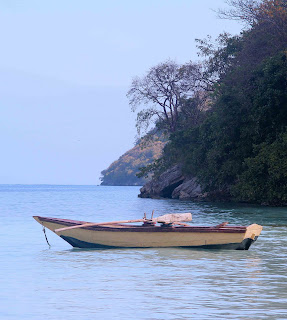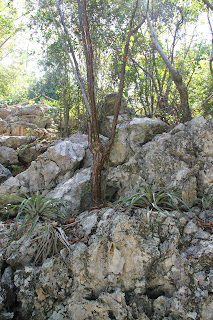
We boarded a water taxi with about 30 others. The owner of the tour, an American ex-pat, and two Haitian young men took us to Paradise Cove.

Roberto summarized Haiti's long and difficult history while we remarked on the beautiful, mostly untouched coastline and the huge mountains which rose so steeply from the water's edge.
Paradise Cove, when we arrived, was one of the most unspoiled beaches I'd ever seen, and we waded ashore through soft white sand and protected, gentle tropical waters. The palm-spotted beach was backed by steep mountains with only one house and a boathouse nearby, built into the hillside. Once ashore, the group was divided into two smaller groups each taking turns on the climb up the zig zagging hillside path to the village, while the remainder enjoyed relaxing on the beach, or on lounges floating in the calm turquoise water.



 My own response was, “So are Plimoth Plantation and Sturbridge village” in my home state of Massachusetts. Locals employed to re-inact what life was like in the sixteen and eighteen hundreds. I see no real difference. The Haitians employed by this tour are locals hired to demonstrate how things are done in the villages inland—which we'd never have any chance to see, otherwise. It's not perfect, but it helped me begin to understand a bit.
My own response was, “So are Plimoth Plantation and Sturbridge village” in my home state of Massachusetts. Locals employed to re-inact what life was like in the sixteen and eighteen hundreds. I see no real difference. The Haitians employed by this tour are locals hired to demonstrate how things are done in the villages inland—which we'd never have any chance to see, otherwise. It's not perfect, but it helped me begin to understand a bit.
And it pumps money into the local economy. Those who were hired as guides had excellent English while the “villagers” had much less, but the craftsmen had the opportunity to sell work and the musicians and guides got additional tips. The tour owner is the second largest employer in the area with about 25 locals at work here.
I came away from this tour with some new perspective. In particular I was fascinated by how many activities in the village require an extended charcoal fire...it's so easy for us to criticize from afar those who cut and burn the rainforest for the trees. If you are stuck without the ability to buy charcoal or wood, you make your own from whatever you can find. The Haitian villagers, we were led to believe, are basically “living off the land” around them. It may not be “sustainable” but it sustains the family then and there. It's very arrogant to make moral judgments on those who have so little, especially without offering an alternative.
The owner also commented at the changes he'd observed over the last three decades in Haiti and in the Dominican Republic. He said that the decision in the 80's by the Dominican government to invest in infrastructure—roads, airports, etc.--had made all the difference. Infrastructure brought investment and construction all along the coastline and now there is a thriving tourist industry with resorts, condos, cruises, and the businesses that supply them. In his words, he's even noticed the existence of an emerging middle class in DR who can now consume goods and keep the economy going. In Haiti, by contrast, any attempt to develop has only landed money into corrupt government pockets over the last 30+ years, discouraging potential building. How sad. Clearly the country has equally spectacular scenery and shoreline, ripe for some thoughtful development, if only there was a stable and honest government to deal with.


Overall, Paradise Cove was a little piece of heaven and a place I'd go back to in a flash.
Beautiful, restful, and educational. I'm sure it's only an approximation of the reality of the interior of Haiti—kind of like Plato's cave shadows. But it's far more than those who stayed on the RCI Labadee private peninsula got to see. They could have been on any well kept beach in the Caribbean; no reminders anywhere that they were actually in Haiti.

No comments:
Post a Comment